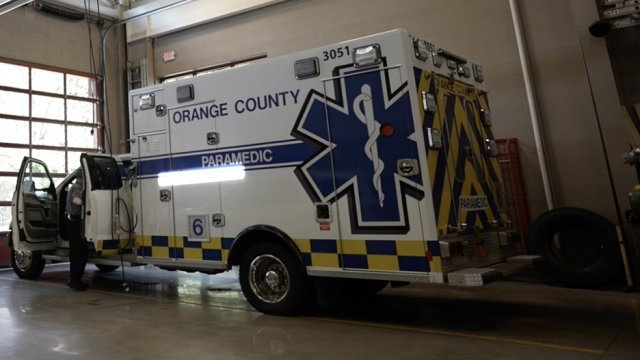Stephanie Gilmore knows nearly every road in Orange County, North Carolina, by heart. It's no easy task considering the county encompasses an area the size of Los Angeles.
Gilmore is an EMT for Orange County and has logged hundreds of thousands of miles behind the wheel of an ambulance over the last 20 years.
Recently, Gilmore and her colleagues have been sounding their own kind of alarm: highlighting the problems with aging ambulance vehicles.
"The older the ambulance gets, the more small problems it creates," Gilmore said as she switched on emergency lights inside her ambulance as she responded to a call.
Orange County has 16 ambulances, and half of them need to be replaced. They're breaking down more often, meaning crews are spending hours each month transferring their equipment from one vehicle to the next.
As the director of Emergency Services for Orange County, Kirby Saunders has the money he needs to buy new ambulances. However, he's been told it could take two years before a new ambulance is ready to hit the road.
SEE MORE: Scripps News Investigates: The deadly toll of a US ambulance shortage
A nearly yearlong Scripps News investigation discovered a severe shortage in ambulance chassis, essentially the skeletal frame ambulances are constructed on. The shortage has left communities like Orange County waiting years for these vital first-response vehicles.
Last year, Scripps News uncovered how automakers like Ford and General Motors started using those chassis and other components for vehicles like pickup trucks at the start of the pandemic. That meant companies that built ambulances faced shortages.
Experts note that consumer pickup trucks are typically more lucrative for automakers to sell.
"I think there could've been more support from the federal government level to ensure the prioritization of critical public safety resources in the community," Saunders said.
Four months after Scripps News first revealed the alarming scope of the problem, some members of Congress are taking notice.
Glenn Thompson, Republican member of the House Representatives, said he was alarmed by the report, adding that he is concerned about aging ambulances on the road.
"They're not state of the art," the Pennsylvania representative said. "They don't have all the bells and whistles and provide life-saving care that could be provided."
Scripps News pressed Thompson for answers about why Congress hasn't taken action to fix the problem. He said that he doesn't believe it's lawmakers' job to force automakers to prioritize public safety over consumer pickup trucks.
"It's pretty tough to tie the hands of manufacturers and dictate you have to sell more to this type of vehicle or that type of vehicle," he added.
SEE MORE: Pickup truck sales pique interest for some in US auto industry
As ambulance manufacturers continue to wait on automakers for the parts they need, the shortage of ambulances only continues to get more dire for American communities.
Scripps News pulled numbers from the National Emergency Medical Services Information System, a Department of Transportation database containing details of nearly every ambulance activation in the United States. The data from 2021 showed there were 13,540 mechanical failures reported that prevented ambulances from responding to potential emergencies. That number increased to 14,905 in 2022.
Scripps News has also learned some ambulances are on the road with over 500,000 miles on them.
Saunders currently has eight ambulances with more than 150,000 miles on them. By June, he expects 10 of his ambulances will have over 150,000 miles, increasing the likelihood of the vehicles breaking down.
In addition to the concern about immediate public safety, Saunders is concerned about the long-term impacts.
"I have no doubt it decreases morale and confidence," he said.
Correction: A previous version of this video misidentified EMT Stephanie Gilmore. This story has been updated.
Trending stories at Scrippsnews.com



